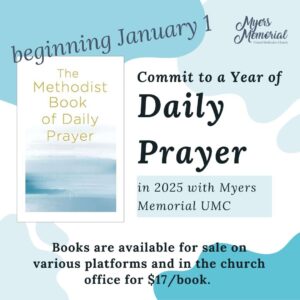
The Wesleyan Means of Grace
United Methodist Communications
Courageous and forward-leaning mission congregations practice spiritual disciplines. Our vital work is a spiritual adventure based in John Wesley’s means of grace. John Wesley taught that God’s grace is unearned and that we were not to be idle waiting to experience grace but we are to engage in the means of grace.
The means of grace are ways God works invisibly in disciples, hastening, strengthening; and confirming faith so that God’s grace pervades in and through disciples. As we look at the means of grace today, they can be divided into works of piety and the works of mercy.
Works of Piety
Individual Practices
Individual Practices
reading, meditating and studying the scriptures, prayer, fasting, regularly attending worship, healthy living, and sharing our faith with others
Communal Practices
regularly share in the sacraments, Christian conferencing (accountability to one another), and Bible study
Works of Mercy
Individual Practices
Individual Practices
doing good works, visiting the sick, visiting those in prison, feeding the hungry, and giving generously to the needs of others
Communal Practices
seeking justice, ending oppression and discrimination (for instance Wesley challenged Methodists to end slavery), and addressing the needs of the poor
Making disciples, growing vital congregations and transforming the world is part of a spiritual adventure that is empowered and guided by the Holy Spirit as churches engage in the means of grace. Spiritual goals are accomplished by connecting the means of grace with proven vital church practices such as planning, strategic direction, prioritization, clear focus and alignment.

The importance of this book is in the daily habit that it seeks to form, not the amount of time you spend doing it each day. If at first the practice feels force, persist. Habits are powerful once they are formed, but the formation takes time. As you build this habit, prayer will become easier, richer and more natural.
The Methodist Book of Daily Prayer offers prayers for morning and evening, plus brief passages of scripture and reflective readings for each day. Wesleyan theology undergirds each selection. Psalms are emphasized. Hymns appear regularly. Classic and familiar writings are included along with original new writing.
Our congregation is committing to a year of Daily Prayer, join us!
- Decide on a consistent time each day.
- Choose a dedicated place.
- Keep your book out in the open so you see it every day. Write down your thoughts, your petitions, and points of gratitude.
- Get a Bible and read more.
- Read with others.
- Don’t be hard on yourself!
The power of practice may not be obvious at first, but the regulars connection to God becomes powerful over time.
- Creates space for healthy ritual of repetition
- Connects us across time
- Connects us with our contemporaries
- Connects us across dividing lines
- Undergirds our Wesleyan way of thinking
- It’s an offering to God, returning to God one of the most valuable gifts we receive: time.

This card is a tool to help you commit to a means of grace for a
period of time. At the heart of Methodism is the uniting of vital piety and social holiness. We accomplish this by practicing the Rule of Discipleship with personal acts of compassion and devotion; and communal acts of justice and worship. With these acts, we grow in our ability to love God with all our heart, soul and mind; and our neighbors as ourselves. As a vital part of our spiritual journey, we practice the means of grace, which include Bible study, prayer, fasting, healthy living, celebrating Communion, visiting the sick and those in prison, feeding the hungry, seeking justice, working to end oppression, and more.
In these practices, God works in and through us.
period of time. At the heart of Methodism is the uniting of vital piety and social holiness. We accomplish this by practicing the Rule of Discipleship with personal acts of compassion and devotion; and communal acts of justice and worship. With these acts, we grow in our ability to love God with all our heart, soul and mind; and our neighbors as ourselves. As a vital part of our spiritual journey, we practice the means of grace, which include Bible study, prayer, fasting, healthy living, celebrating Communion, visiting the sick and those in prison, feeding the hungry, seeking justice, working to end oppression, and more.
In these practices, God works in and through us.
You’re invited to fill the squares with a means of grace, spiritual discipline, or practice you will commit to for 2025. At the 2025 Servant Leader Summit, we committed the 6th space to praying for our ministry with the children, youth, young adults, families with young children, and those with special needs.

